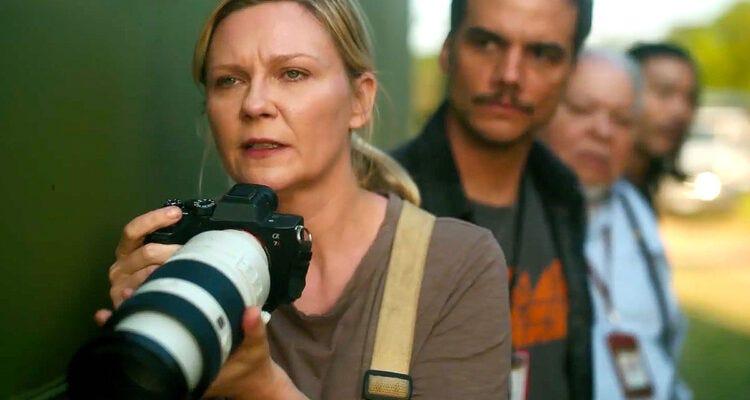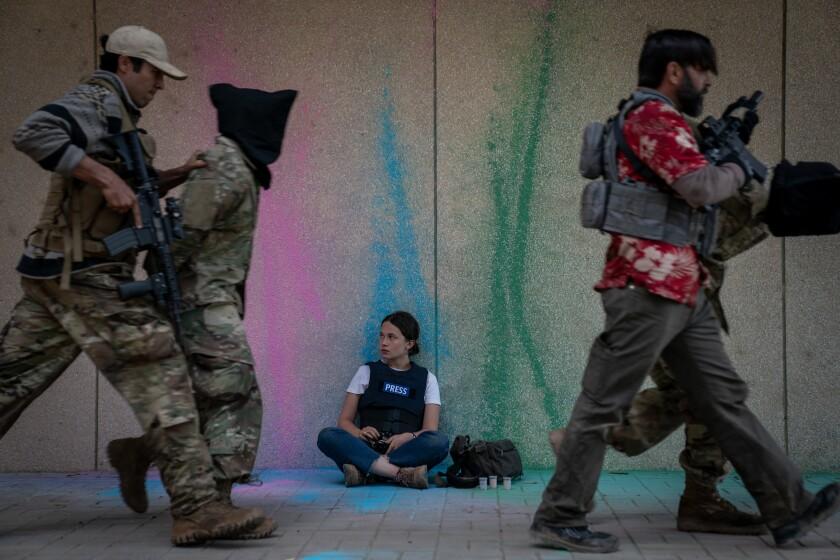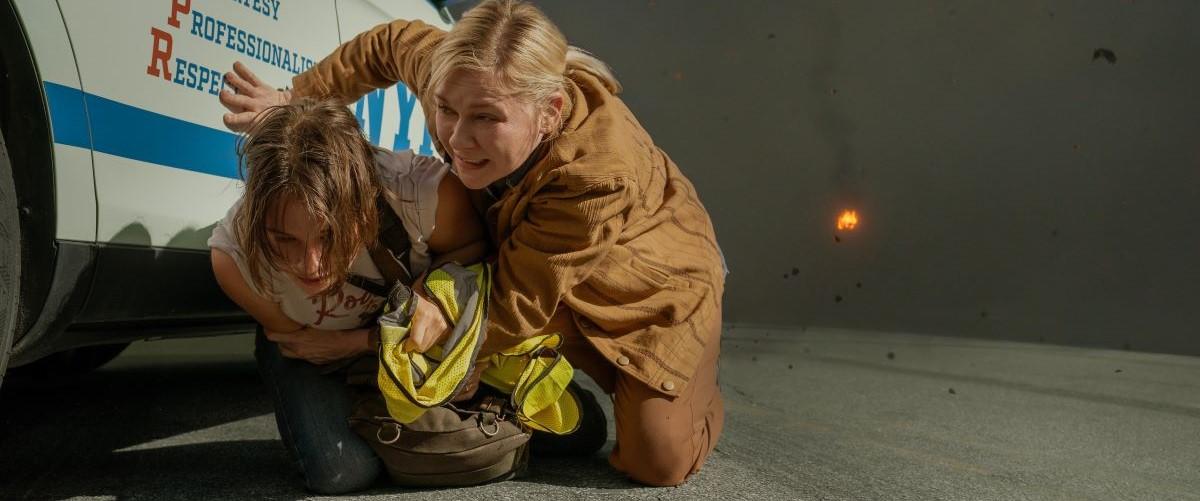Alex Garland’s Civil War depicts a fictional US conflict that is less about conveying a political perspective as it is a tense statement about the normalization of violence and collectively losing sight of the bigger picture.
Poignancy in film is sometimes on purpose, sometimes just coincidence. Civil War is a bit of both. Here is a film that recognizes the diplomatic atmosphere being as strained as it has been in a very long time, but also comes to theaters exactly at the right time when those conflicts are heightened to a worryingly improbable end. Civil War may depict a fictional conflict in the United States, but it’s message speaks to the global increase of violence in our lives driven by the splintering of society towards radical perspectives – in specific those who act upon them and those who pretend they aren’t a threat.
Those exact perspectives aren’t clearly defined in Civil War, which is a detriment to those viewers who are hoping the film will champion their own specific views. Instead, director Alex Garland makes the choice to not explicitly detail the cause of his fictional civil war, but instead realize the greater implications of that conflict on the general population. It recognizes the general opportunity of how things could get out of control here in the US, as if to demonstrate that the systems of our precious constitution are just as susceptible to abuse as anywhere else in the world.
Civil War
Directed By: Alex Garland
Written By: Alex Garland
Starring: Kristen Dunst, Wagner Moura, Cailee Spaeny, Stephen McKinley-HendersonRelease Date: April 12, 2024
By not providing a concrete reason for the conflict, Garland’s film suggests the flaws of humanity make it inevitable. He reinforces this theme by peppering in accounts of people who are pretending the war isn’t happening, as if to suggest their ambivalence played a role. The film contrasts the experiences of those people with their heads buried in the sand by spinning a narrative around those who are paid not to: war correspondents.

The story focuses on a renowned journalist Lee Smith (Kristen Dunst) who has made a name for herself covering harrowing atrocities across the globe, and her colleague Joel (Wagner Moura) who lives for the thrill of experiencing the thrill of battle in person. As the civil war is upon the precipice of conclusion, they decide to race to Washington D.C. to try and interview the President of the United states before he is captured by his opposition. In this journey they are joined by Sammy, a veteran reporter who would rather die than stop working (Stephen McKinley-Henderson), and Jessie (Cailee Spaeny), a young and inexperienced photographer who looks up to Lee.
Lee and Joel are an experienced 2-man crew who have been together through some very dangerous conflicts depicted to the audience through flashbacks. Sammy and Jessie’s involvement thus represents a hazard because they don’t just have to worry about themselves, they have to look out for two people who don’t have the same capabilities as they do. But while Sammy is willingly putting himself in danger and has the wherewithal to know exactly what he is getting himself into, Jessie does not. Joel and Lee’s opposing perspectives on the approach to their work is something that makes their working relationship function, but it creates conflict in regards to Jessie.
Lee is reluctant to bring Jessie in under her belt and show her the ropes because she has seen the worst of humanity and fears Jessie isn’t prepared for it both emotionally and physically. Lee doesn’t want to have to care about someone else because it may compromise her ability to do her own work. Meanwhile Joel is excited to be able to share his enthusiasm for being in the thick of the battle and wants to help Jessie experience this for the first time. For her part Jessie realizes the uncomfortable burden her presence places on the group, but knows that if she wants to further her career this is a golden opportunity she would never get if she played it safe.

In this way, all of them essentially exploit the pain and suffering of others for their living. This experience has essentially numbed them to the motivations of the conflict, which is part of the reason why the film doesn’t spend time commenting on them. Furthermore, it isn’t really possible for Lee & Company to be on one side or the other because the integrity of their craft and personal safety requires them to be ambivalent. In many ways they hide behind it like a shield. While they can’t ignore the conflict, their reasoning to not be on one side or the other is just as selfish as those who are ignoring the conflict.
You could construe this as a criticism of the media, which I think may be valid. But I think the point is the fact that our society is at a point where “sides” are necessary in the first place. This is a bigger criticism of the world’s social development as a whole. Rather than be motivated by the greater good, we’re motivated by selfish desires and we channel that into picking “sides”. At one point in the film, the main characters encounter a man with a gun who has captured and tortured two men because they were stealing from him. He comments on how he had gone to high school with one of them, suggesting the extremes that have become necessary – even in a civilized first-world nation – for individual survival.
Director/writer Garland first made a name for himself in cinema by reinventing the zombie genre for the 21st Century with his script for 28 Days Later. In many ways, Civil War feels like a zombie movie. The world it depicts has fleeting reminders of normalcy amidst a harrowing almost post-apocalyptic fight for survival. There are gripping action sequences with sound design that pummels you into the back of your seat. And yet most of the film is quiet, expressing the void of humanity from this possible future. Garland depicts empty streets with the occasional roving military vehicle, others are littered with the carcasses of cars and equipment abandoned long ago. Like a zombie movie it hinges on humanity’s hubris – despite all our impressive accomplishments we’re still a deeply flawed species.

Kristen Dunst portrays Lee the entire film with the aghast expression of someone who has seen too much. But Jessie’s inclusion in her life is what ultimately breaks her. Not because she witnesses her loss of innocence first-hand, but because Lee sees herself in Jessie. From this outside perspective Lee begins to feel the guilt that she had hid away for all these years. Reporting on these terrible events doesn’t necessarily bring heightened concern from the general public, instead it fuels our tolerance for them.
Civil War offers us the ultimate paradox of our modern information age; the more we know about what is going on, the worse off we are. Truth becomes the enemy not because of what it means to us, but because of our selfish reactions towards it. The film conveys a pulse-quickening tale of survival in a harrowing dystopia of fear towards knowledge. It flies in the face of every horror film where we’re told that the most frightening thing is the unknown.

